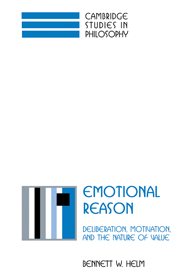2 - Emotions and the cognitive—conative divide
Published online by Cambridge University Press: 19 September 2009
Summary
Philosophical accounts of freedom, practical reason, and moral or personal value typically presuppose that we already understand what it is for us to have the capacities for desire and evaluative judgment, capacities that are typically understood in light of the assumption of the cognitive–conative divide. Consequently, these accounts proceed without questioning that assumption or the resulting understanding of these capacities; this is, I believe, a mistake. In this chapter, I shall bring this assumption into question, arguing that an adequate account of our evaluative attitudes, and therefore of value itself, requires that we reject the assumption. In its place I shall offer an account of value as constituted in large part by what I shall call “felt evaluations,” a notion I use to provide a distinctive kind of account of emotion and desire. This account will be sketched here, and developed in more detail in chapters 3–4.
THE PROBLEM OF IMPORT
The picture physical science paints of nature is one of pure mechanism, devoid of any kind of meaning whatsoever. As mechanistic, nature operates according to laws that specify how things will happen or generally tend to happen; consequently, the possibility of there being normative standards of correctness in these physical processes is simply unintelligible from within this picture. On the face of it, such a picture of nature seems at odds with the existence of minds like ours, for minds essentially involve meaning and representational states and therefore standards of correctness in terms of which these states are to be assessed. Moreover, minds seem essentially to involve conscious states with a kind of subjectivity and potential for freedom that again seem not to fit into our understanding of mechanism.
- Type
- Chapter
- Information
- Emotional ReasonDeliberation, Motivation, and the Nature of Value, pp. 29 - 59Publisher: Cambridge University PressPrint publication year: 2001

